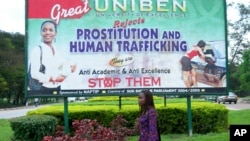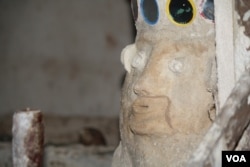Mary was 16 when she was trafficked from her home in southern Nigeria to northwest Italy where she was forced to work as a prostitute on the streets of Turin.
She told the Thomson Reuters Foundation her story by phone from Nigeria's southern Edo state.
"I came from a polygamous home where I was one of 12 children. My mother was the first wife and worked as a petty trader while my father sat by the roadside, doing nothing.
"I was 16 years old when a woman approached my mother and said she could help take me abroad to work. I didn't want to go. I had just finished secondary school and wanted to continue my education, although my family could not afford it.
"My family kept trying to persuade me to accept the offer, referring to other girls who had gone abroad to work and had built homes for their families. This led to several quarrels, and they became aggressive, with my brother threatening me.
"Eventually, I agreed to go, but I had no idea what I was in for.
"Before I left, I was taken to a native doctor's shrine, and told to bite the neck of a chicken to add its blood to a concoction made with my hair and fingernails, and my underwear.
"I was then made to take an oath invoking madness and then death upon myself if I refused to pay whatever I owed my madam when I eventually got to Italy and began working."
Debt and Juju
"I first arrived in Germany, where a man picked me up and drove me to a house in Turin [in Italy], where I slept in a room with more than a dozen other girls.
"As a girl left the house, she noticed that I was on my period and told me I was lucky. She said being on your period meant that you would not have to go through a pregnancy test and a forced abortion if they found out that you were pregnant.
"My madam asked me to join the girl to work, and I asked: 'What kind of work?' The girl told me that we were working in prostitution.
"Reluctant to go, I stood on the corner of the street, away from where potential customers might see me. When my madam found out, she beat me with the handle of a mop."
"I was given a target income to meet each week, and if I did not meet this, whatever I had earned would not be counted, and I would have to start all over again to pay off what I owed.
"Whenever I complained about this, I was beaten. My parents were also threatened. I was told that if I didn't behave, my parents would be taken out onto the streets and made to suffer."
Self-hatred
"After three years of working as a prostitute, I was arrested on my way to work. I met dozens of Nigerian girls at the [police] station who had also been arrested. We were eventually repatriated to Nigeria. There were more than 100 of us on the same flight."
"I returned to Nigeria with nothing. My parents didn't know what I had been doing until I came back and told them. They were disappointed as their expectations had been cut short. I tried hard not to hate them. I already hated myself."
"I began looking for a way to go back to Italy — it seemed better than doing nothing, being scorned by my family and being constantly reminded that I had been deported back to Nigeria. Around this time, a friend introduced me to the Girls' Power Initiative in Benin [the capital of Edo state]. Counseling was the first thing they did. If it wasn't for them, I would have been re-trafficked."
"The same woman who had taken me to Italy soon approached my family again and offered to take me back. She visited my home about five different times to try and persuade them. Now I help other victims of trafficking, and use my own experiences to dissuade others from going to Italy to work."
"Many girls today, unlike me, know exactly what they are in for when they agree to go to Italy to work. They say: 'Is it not prostitution? No problem — I will go.'
"But they do not understand the trauma they will face."






